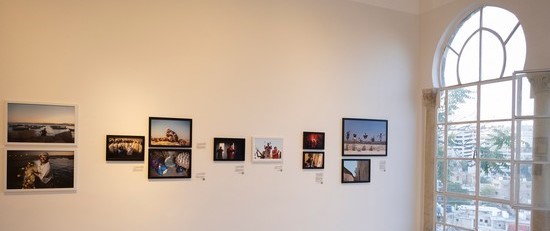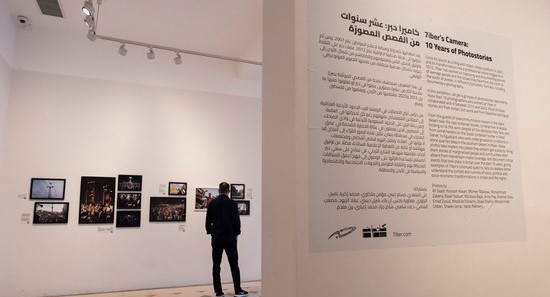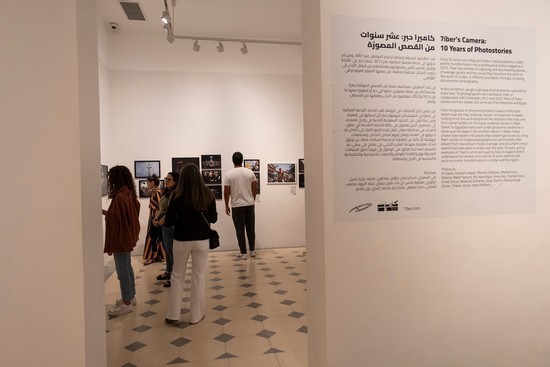From its humble beginnings as a voluntary citizen media blog
in 2007, 7iber transformed into a professional journalism magazine in 2012.
The magazine, which now produces in-depth multimedia
journalism, critical analysis, and public debates on various political,
economic, social, cultural, and intellectual issues, started with a small team.
Since then, the platform and the operation has grown exponentially.
اضافة اعلان

In an exclusive interview with
Jordan News at the 11th
edition of the Image Festival, Lina Ejeilat, co-founder and executive editor of
7iber, discussed the significant milestones and challenges encountered during
the 16-year journey of the publication.
Displaying a rich and unique collection, 7iber showcased the
works of 14 journalists who have worked closely with the magazine. Each photo
told a unique news story.
“Journalistic work is by nature governed by balances of
power, sometimes visible and others invisible,” said Ejeilat.
Journalists, she added, can create spaces that enable them
to work within these balances, as it is their job “to persevere, not give up,
and try in every way to relate with issues that affect people’s lives and their
reality”.
Throughout the years, 7iber has diligently presented these
stories and issues in the most compelling and aesthetically pleasing manner,
she said, underscoring the crucial role of visual narration and photography in
their production.
Unearthing underrepresented stories
Ejeilat emphasized that 7iber's chosen form of journalism is
not driven by the pursuit of breaking news but rather by unearthing the stories
behind the news.
“We actively search for narratives from underrepresented
places that often lack media coverage, which takes significant time and
effort,” she said.
In addition to the commitment, sustaining this form of
journalism poses an additional challenges, as the majority of their income is
derived from projects funded by international institutions and a small portion
from analytical services, training, and consulting.
Maintaining independence
For 7iber, maintaining their political and editorial
independence has always been a top priority.

While they appreciate the contributions and support from
various institutions, Ejeilat highlighted the need to diversify their sources
of income, as relying solely on external funding is not sustainable.
“Our role is not just limited to producing professional and
critical journalistic content; it also involves building the institutional
foundation that allows their press to thrive,” said Ejeilat.
In the Arab media landscape, she added, the scene is
dominated by government funds and commercial interests.
The exhibition at the Image Festival represents 7iber's
experimental approach to generating income by offering photographs for
purchase.
Ejeilat expressed that producing the stories they present
often involves venturing outside urban centers, engaging with people, and
conducting extensive research.
Readers, she added, may not fully grasp the effort behind
each story, such as a recent report on fishermen in Aqaba, which involved four
days in Aqaba for interviews, followed by an additional three days with a
photographer to compile the report.
“7iber is not a news site but a magazine committed to
producing daily in-depth stories,” she added.
Facing constraints
Ejeilat acknowledged the presence of many professional
journalists in Jordan who face constraints related to production speed and
commercial considerations.

7iber’s reader base, however, seeks thought-provoking and
comprehensive reports that provide answers to their questions. Given that the
platform, attracts diverse readers, including students, journalists, and
academics, constant communication with their audience helps 7iber remain
attuned to their readers' needs and preferences.
This is why “the magazine strives to present a well-rounded
perspective based on factual and cognitive details,” said Ejeilat.
COVID-19, she said, cemented this need.
Recognizing the need for in-depth yet accessible scientific
health journalism aimed at non-specialized audiences, 7iber translated topics
from international newspapers and embarked on producing scientific stories that
captivated readers both within and beyond Jordan.
This approach helped dispel rumors and misinformation and
explained previously unanswered questions and ambiguous information, she added.
Shaping public discourse
Ejeilat acknowledged the challenges faced by their small
team within the constrained space of media freedom. This reality extends to all
media and journalism professionals. And Social media's influence on journalism
cannot be understated.
Social media, she said, has played a significant role in
shaping public discourse. However, it often amplifies fleeting news or bubbles
that dominate public debates. While there may be pressure for 7iber to
participate in these discussions, “we seek sustainability,” she said.

“We strive to have a business model that will continue,” she
added. And despite the pressure to give into ad-only news or fast news, 7iber
remains dedicated to continuing their discerning perspective and providing
stories that matter.
Journalism, said Ejielat, is more than a technical
profession; it intersects with fields like history, humanities, and literature.
“Journalists must be researchers and avid readers, always
thinking within a broader context.”
Read more Features
Jordan News




